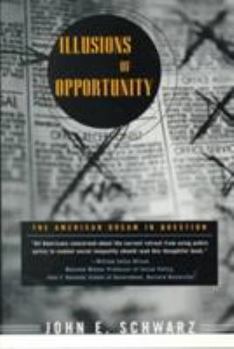Illusions of Opportunity: The American Dream in Question
Select Format
Select Condition 
Book Overview
The American dream depends upon the idea that every American who works hard can support a family and get ahead. This book presents a measure of ideal against reality, calculating how much opportunity is available relative to the number of households reliant on it. This measure reveals that nearly a quarter of American families cannot find adequate work despite economic growth. Joh Schwartz demonstrates that neither global competition nor governmental interference are the culprits and he shows that the American dream might become reality.
Format:Paperback
Language:English
ISBN:0393973913
ISBN13:9780393973914
Release Date:January 1998
Publisher:W. W. Norton & Company
Length:238 Pages
Weight:0.70 lbs.
Customer Reviews
3 ratings
Never got its due
Published by Thriftbooks.com User , 15 years ago
This is a remarkably good book which has become even more timely since it was published twelve years ago. Sadly, it has never gotten the attention it is due. Schwartz's thesis is that the primary problem with the American economy is, and has long been, failure to create an adequate number of reasonably lucrative occupational opportunities. Those who commonly resort to victim-blaming in discussions of the decline of the middle class and reduction of the working class to the working poor are skillfully cut short through invocation of James Madison's thesis of economic competency. According to Madison, the survival of any society depends, in the long run, on providing the means whereby hardworking people can make a living for themselves and their families. Otherwise, what is society for? Anyone familiar with the relentless and unsubstantiated attacks on public education, and the dismissal of most families as willfully dysfunctional will find a compelling response in Schwartz's book: social and economic decline are not due to deficient schools or ineffective families, but to the opportunity-poor macro-structure in which these institutions are located. To closely paraphrase Schwartz, no society survives on incantations alone, so the common claim that "you can make it if you really want to" can reasonably construed as a rhetorical precursor to the demise of American society. The Illusions of Opportunity provides us with compelling evidence that the most useful books sometimes go largely unread.
Never got its due
Published by Thriftbooks.com User , 15 years ago
This is a remarkably good book which has become even more timely since it was published twelve years ago. Sadly, it has never gotten the attention it is due. Schwartz's thesis is that the primary problem with the American economy is, and has long been, failure to create an adequate number of reasonably lucrative occupational opportunities. Those who commonly resort to victim-blaming in discussions of the decline of the middle class and reduction of the working class to the working poor are skillfully cut short through invocation of James Madison's thesis of economic competency. According to Madison, the survival of any society depends, in the long run, on providing the means whereby hardworking people can make a living for themselves and their families. Otherwise, what is society for? Anyone familiar with the relentless and unsubstantiated attacks on public education, and the dismissal of most families as willfully dysfunctional will find a compelling response in Schwartz's book: social and economic decline are not due to deficient schools or ineffective families, but to the opportunity-poor macro-structure in which these institutions are located. To closely paraphrase Schwartz, no society survives on incantations alone, so the common claim that "you can make it if you really want to" can reasonably be construed as a rhetorical precursor to the demise of American society. Illusions of Opportunity provides us with compelling evidence that the most useful books sometimes go largely unread.
The limits of the free-market to provide opportunity
Published by Thriftbooks.com User , 26 years ago
In a time of ongoing reports of historically low "unemployment rates" this book offers an important corrective. Schwarz shows just how unhelpful our typical figures for unemployment are, and he makes a persuasive argument for the importance of focusing as a nation on the need to provide jobs that actually pay a living wage. The initial chapters may be a bit tough going, as he argues that provision of adequate opportunity has been a central part of the founding fathers' vision for America. But the latter chapters make clear just how short of this vision we have fallen. Schwarz shows that for a large number of Americans it does not matter if you have the skills, are kicked off of welfare, or are willing to work hard -- beyond a certain point our economy simply does not have the jobs for millions of adult Americans who need them. Some readers may balk at his proposals for addressing this problem, but this book may help all involved in the debate take the issue of actual vocational opportunity more seriously. This is the most important book on public policy that I have read in several years. David Carr, Columbus, Ohio





